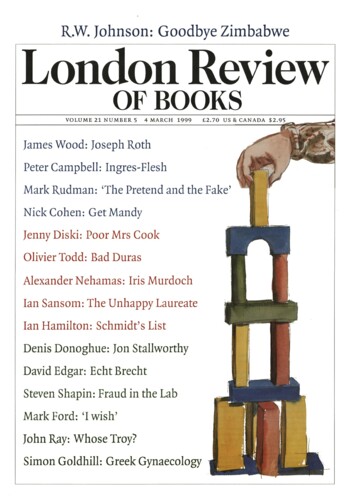Sam uses the words ‘pretend’ and ‘fake’ to
distinguish representations from real
things. Since all movie ratings are specious,
conflating the slangy use of curse words,
sickening violence, and kinky sex, I
risked taking him to whatever films I thought
would stimulate his imagination.
When I asked if he was scared, he’d answer
in a bold and firm voice: ‘No, dad, it was just
pretend.’ He found the distinction between
the representation and the real, absolute.
If anything in a film looks fake he’ll let me know.
This usually opens the door to a dialogue on
what is objectively real and fake,
like locations as opposed to sets; or
scenes where an actor
appears to motorcycle through a town
as a bomb goes off and remain
fractionally ahead of the explosion
as smoke and flames fill the screen,
when the images were shot separately –
and the actor is riding in an empty room
where blocks hold the wheels in place and fans
blow his hair and the town is a model.
Invention hasn’t kept pace
with special effects.
Since Sam’s obsession with the real and the fake
runs curiously parallel to my own, and
since it’s his responsibility to comment
each time he spots sleight-of-hand, cinematic
or otherwise, I asked if we couldn’t
agree that all representations – all
art – and in this case screen images,
are equally fake, imaginary, pretend.
The beauty of Where Eagles Dare,
and Mary Ure’s role in it, beginning when,
a spy among spies, she’s smuggled in
with the baggage in the belly of the plane,
is that it doesn’t straddle the fence
of believability. Cast as the lone
female among rugged men
whose mission is to raid the German
stronghold in the frozen heights,
Mary bewitches the enemy in quieter ways;
extracts information with a glance.
And why break down the lovely moment
when she and her partner, Richard
Burton, reunite in an appointed barn,
which emanates warmth,
and Mary leans back against the haystacks
to welcome her lover’s embrace.
So much had happened in
less than a decade,
who knows they hadn’t forgotten
how much they’d liked
playing opposite each other
in the film version
of Look Back in Anger.
Send Letters To:
The Editor
London Review of Books,
28 Little Russell Street
London, WC1A 2HN
letters@lrb.co.uk
Please include name, address, and a telephone number.

